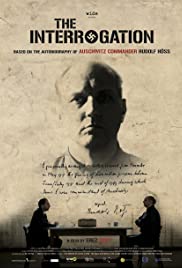
THE INTERROGATION
Israel, 2016, 83 minutes, Colour.
Romanus Fuhrmann, Macej Marczewski.
Directed by Erez Pery.
This is a brief and sober film, an Israeli production, filmed in Germany.
Basically, the film is a two-hander, though it has been opened out for some glimpses of the passing countryside. The Polish prosecutor who speaks German is assigned to interrogate Hoess, who had been the administrator in charge of the concentration camp of Auschwitz.
As the title indicates, most of the film is about the meeting between the prosecutor and the criminal, in a stark room, sometimes with a guard, reel to reel tape recording, some words, some silences, listening again to the tapes, the interrogator having a commission to get the story from the criminal and then escort him to execution.
The dialogue does two things: Hoess is able to describe his career, his mentality, the Nazi ideology, construction at Auschwitz, the reception of Russian prisoners, of the Jews and their elimination; but it also enables Hoess to give his own story, his family, fanatical Catholic father, thoughts of his becoming a seminarian, his love for animals and farms, chosen by Himmler, subscribing to the SS ideology, proven to be reliable, but the toll on his psyche, withdrawing, drinking, alienated from his wife, continuing to follow orders. And this is true of the other officials and guards in the camp.
There are some personalised sequences between the interrogator and his wife, the interrogator going to the execution of the audience seeing only the criminal’s legs and a stool which is kicked away and his death throes.
A sober and sombre 21st-century reflection on the Holocaust.
1. The title? The German authorities after the war? Poles? Auschwitz? Hoess as administrator of Auschwitz and his being called to justice?
2. The background of this film, from Israel, German and Polish background? Memories of World War II, memories of Auschwitz and the Holocaust? Audience knowledge of the events, attitudes? The commanders, the guards? The extinction of Russian soldiers? Of the Jews?
3. The stark film, sombre and sober, dark and shaded?
4. The prosecutor, in his room, the phone call, obedient, the nature of the interrogation, driving to Kraków, the scenes of the countryside from the passing car? His age, appearance, dapper, his commission, to get the confession, to accompany the criminal to execution?
5. The interview room, sober, the typewriter, the prosecutor bringing his tape recorder, reel to reel? Guards present, sometimes asked to leave?
6. The interrogation, in words, pauses, silences? Tape-recorded? The prosecutor listening again? The assessment of what he heard?
7. The portrait of Hoess, the interrogation, the background of his being a Nazi monster, obeying orders, the Nazi ideology and psychology?
8. The more humane portrait, as a boy at home, his parents, fanatic Catholic, thoughts of being a priest? Love of animals, farms, with his wife? Going to the SS? Absorbing the ideology, the uniform, conforming?
9. Himmler, choosing Hoess, the different jobs, Hoess as reliable, rebuilding the concentration camp, to take 10,000 prisoners? The prisoners at work, his explaining the positive aspects of Arbeit Macht Frei?
10. Auschwitz, the experience, building up the concentration camp, the number of those coming, the Russian soldiers, the Jews? The underling and the experiments with gas? Success? His orders, eliminating the Jews, no emotions allowed to be expressed? The various officials and their obeying orders throughout the camp? Loyalty to Hitler, no questions?
11. The details of the death-work, stripping, going into the gas, the crowds, the quick choking, the heaps of bodies? The effect?
12. The personal cost, Hoess and is becoming withdrawn, drinking, difficult relationship with his wife, his continuing his work?
13. The contrast with the prosecutor, the background of his family, the scenes with his wife, love, the shower, his returning home to her?
14. Accompanying Hoess to execution? Audience seeing the legs, the stool and its being pushed away? The throes of death?
15. The purpose of this film in the 20th century – genocides and lest we forget?